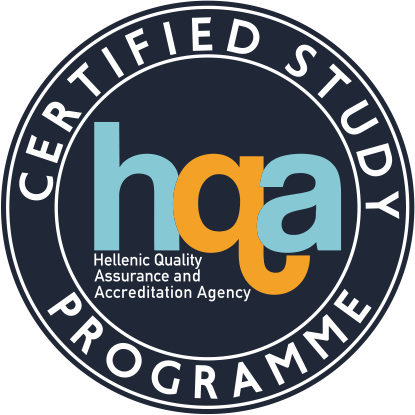Greek Tourism Development and Economy
Undergraduate level | 3rd semester | Compulsory Unit | ΟΚ4500
Credit Units ECTS: 5
Teaching Hours (Weekly): 3
Course Type: General Background
Prequisites: --
Teaching and Examination Language: Greek
For Erasmus students study course and exams are offered in English.

Course Material
- The notion and characteristics of the Greek Tourism Development Analysis of the relevant with Tourist development issues and structures.
- Typologies of Tourism Development: types and patterns of development in the contemporary world and Greece.
- The relation of Tourism Policy, Development and Economy of a National Tourist Destination: international examples and comparison with the Greek case.
- Tourism Economy Issues: Supply and Demand of Tourist Services in a Macro and Micro economic level.
- The characteristics of Tourism enterprises operation: impacts on the Economy and Development.
- The Greek case: issues and characteristics of the evolution of Greek Tourism.
- The economic facts of the functioning of the Greek Tourist Sector.
- Case studies: international and from Greece.
Learning Outcomes
The aim of the course Greek Tourism Development and Economy is to examine the facts and characteristics of the developmental course of Greece as a Tourist Destination. In this framework the developmental data are marked in the different historical periods of Tourism Development. Furthermore, the economic characteristics are registered the structure and the performances of the Greek Tourist Economy. After the successful completion of the course the student will be able:
- To comprehend basic notions regarding Tourism Development and the Tourism Economy.
- To understand the importance of Tourism Policy in the processes of Tourism Development.
- To know the basic dimensions and indexes of the Greek Tourist Economy.
- To comprehend the stages and the different periods of the Tourist Development of the country.
- To become familiar with the special facts and peculiarities of the Greek Tourist Development and Economy.
- To know the facts and characteristics of the competitive to Greece Tourist Destinations.
General Skills
After the successful completion of the course the student will have obtain a broader framework of abilities and knowledge which will give him/her a competitive advantage regarding its occupation in Tourism Enterprises, Tourism Local Governments or tourism departments on the broader Tourism Public Sector.
Learning and Teaching Techniques - Evaluation
Teaching Methods: Face to face
Use of ICT: Presentations using power point, making use of e-class, short videos to develop dialogue.
Course Organization:
| Activity | Semester Work Load |
|---|---|
| Lectures | 39 |
| Exercises | 16 |
| Individual study | 70 |
| Total | 125 |
Assessment Methods:
Language of evaluation: Greek Final Exams (60%) Assignments (40%)
Suggested Bibliography
- Tsartas, P., (2010) Greek Tourism Development, Kritiki
- Tsartas P., Lytras P., (ed), (2017) Tourism, Tourism Development: Contributions of Greek Scientists, Papazissis
- Sarantakou, E. (2010). Mature tourist destinations. Evolution and possibilities to transfer to a sustainable model of summer-cultural tourism: The Greek case (PhD Thesis).
- Tsartas P., Sarantakou E., Kontis I. Alexios-Patapios, 2016. “Tourism Development Models in Greece: Trends and Challenges in an effort to change the paradigm”, in: Rontos, K., José António Filipe, Tsartas, P., (eds), 2016. Modeling and New Trends in Tourism: A Contribution to Social and Economic Development, Nova Publishers, USA.
- Tsartas, P., Papatheodorou, A., and Vasileiou, M. (2014) Tourism Development and Policy in Greece. In Costa, C., Panyik, E. and Buhalis, D. European Tourism Planning and Organisation Systems: National Case Studies (Volume III), Clevedon: Channel View Publications.



